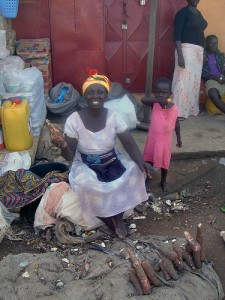MOTIVATION
Recognizing that agriculture is critical to Ghana’s vision of becoming a middle-income country by 2015, IFPRI, in partnership with the Ghanaian government and several development partners, launched the Ghana Strategy Support Program in 2005. The program, funded by USAID, supports the country-driven design of agriculture and rural development strategies by strengthening the skills of Ghanaian researchers, administrators, policymakers, and civil society. One of the key activities of the program is the monitoring and evaluation of Ghana’s progress in achieving the Millennium Development Goals for accelerating growth and reducing poverty. The program also assists in strengthening the analytical capacities of partners, such as the Ministry of Food and Agriculture, the Ministry of Finance and Economic Planning, the Institute of Statistical Social and Economic Research, and the University of Ghana.
OUTCOMES
- The Ghana Strategy Support Program’s economic models are an important tool for analyzing growth and the effectiveness of poverty reduction efforts. An external evaluator found that the Ghana Strategy Support Program plays a vital role in the country’s strategy and policy development process, an increasingly important resource as the country develops its new agricultural strategy to achieve the CAADP and Millennium Development Goals.
- The program works with the statistical unit of the Ministry of Food and Agriculture to support the development of a national statistical system that regularly makes information available for research and monitoring purposes—an essential step to building local research capabilities.
- In 2012, the program’s work on producer price setting and the management of the cocoa sector was the foundation for a policy brief drafted by the World Bank for the Ghana Cocoa Board and the Ministry of Finance and Economic Planning. The report also served as an expenditure review of the cocoa sector that will feed into a broader review to be completed by the Ministry of Food and Agriculture.
- In May 2011, the program organized a study tour from Ghana to India. Parliamentarians, government officials, farmers, and scientists visited research institutions and interacted with private companies engaged in agro-production. One of the parliamentarians sought assistance from India via the India/Africa fund to strengthen the Kwadaso Agriculture College.
- IFPRI’s research was quoted in the documents of Ghana’s Comprehensive Africa Agriculture Development Programme roundtable and in the World Bank’s Country Economic Memorandum. Additionally, the World Bank referenced the IFPRI Social Accounting Matrix database in its work constructing scenarios around the Millennium Development Goals.
- IFPRI research supported the long-standing demand for the establishment of the Northern Ghana Development Fund. IFPRI research helped to make the case for increased government investment in northern Ghana and encouraged the production of cash crops in the North to maximize ongoing poverty reduction efforts.
- IFPRI’s datasets and documentation are employed in the work of modeling teams at the Universities of Cape Coast and Ghana.
- The Deputy Minister of Finance and Economic Planning established a small modeling team within the ministry after IFPRI researchers built analytical and strategic capacity through a series of workshops on economic modeling. The workshops included participants from the Ministry of Finance and Economic Planning, the Ghana Statistical Service, the Institute of Statistical, Social, and Economic Research, the Bank of Ghana, the National Development Planning Commission, and the University of Ghana. Workshop leaders trained participants in developing databases, conducting statistical and other types of analyses, and interpreting results.



